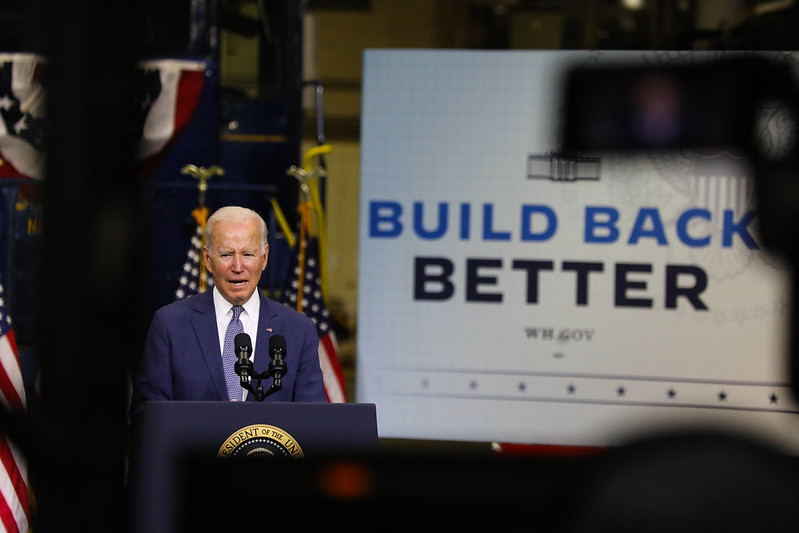The Build Back Better Plan: What Does that Mean for the Future of Clean Energy?
November 2021
by Monica Starr
Monica Starr is an intern with Ecology Florida, serving as the Public Communications Facilitator for Ecology Florida News. Monica is a graduate student at the University of South Florida studying Global Sustainability.
A few weeks ago, the White House’s Build Back Better plan was presented. This plan included the biggest clean-energy investment in United States history. This package includes $555 billion of incentives like tax credits, grants and policies with the goal of reducing greenhouse gas emissions that contribute to climate change [1]. Having government support when tackling environmental issues like climate change can be extremely inspiring. This type of investment that allows companies to benefit from green energy shows us that we truly can have it all. When we invest in sustainable, clean energy with financial incentives, both businesses and the environmental sector can benefit.
This bill includes a variety of tax credits that companies and consumers can take advantage of. For example, there are tax credits that make it easier to everyone to buy electric vehicles. Similarly, there are tax credits for the installation of solar panels, which is now the least expensive form of renewable energy available. The manufacturing of wind turbines and other clean-energy equipment in the U.S. will be both more affordable and user friendly. This development of the clean energy sector not only will create jobs, but it will allow renewable energy to be available to all consumers with an emphasis on manufacturing products here in the United States. This type of investment is a huge win for the environmental sector while moving forward towards clean energy that is affordable for all consumers.
This Build Back Better Plan is a way to demonstrate to the United Nations that the U.S. is taking action to live up to our climate commitments. Former EPA head Carol Browner finds the legislation to be “game changing” [1]. Browner worked under President Obama as a climate adviser and explains that compared to the 2009 stimulus bill, the clean energy commitment in this bill is a massive improvement. There was obviously criticism of this plan from Republican lawmakers, especially ones that invest lots of money in fossil fuels. That’s the beautiful part about green energy, however. The consumer does not have to invest millions of dollars into it to see the benefits. Average consumers can install solar panels on their homes affordably, which reduces energy usage and reduces the electric bill every month. With this new bill, the cost of installing solar on a residential rooftop is reduced by at least 30% and the payback period shortened by five years [1]. An electric-vehicle tax credit in the legislation will lower the cost of electric vehicles made in America with all domestic materials and union labor, opening up the market for electric cars to middle class Americans, rather than limiting them the wealthy.
From the beginning, many Republicans, like Andy Biggs from Arizona, have been critical of this plan because “the president and his allies in Congress have consistently advocated for policies that have led to higher energy process and increased inflation” [1]. None the less, after the wildfires and flooding of this past year, and dire warnings from the scientific community, Biden and his fellow Democrats have placed clean energy at the center of their economic agenda. Tax credits available will supercharge the renewable energy revolution by making clean energy cheaper, rather than imposing taxes on fossil fuels. In this regard, the Build Back Better Plan brings good science together with good governance, benefiting consumers both environmentally and economically.
Monica Starr is an intern with Ecology Florida, serving as the Public Communications Facilitator for Ecology Florida News. Monica is a graduate student at the University of South Florida studying Global Sustainability.
[1] https://www.washingtonpost.com/climate-environment/2021/10/28/climate-biden-build-back-better/


Leave a Reply